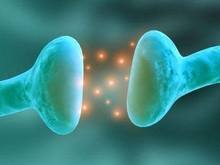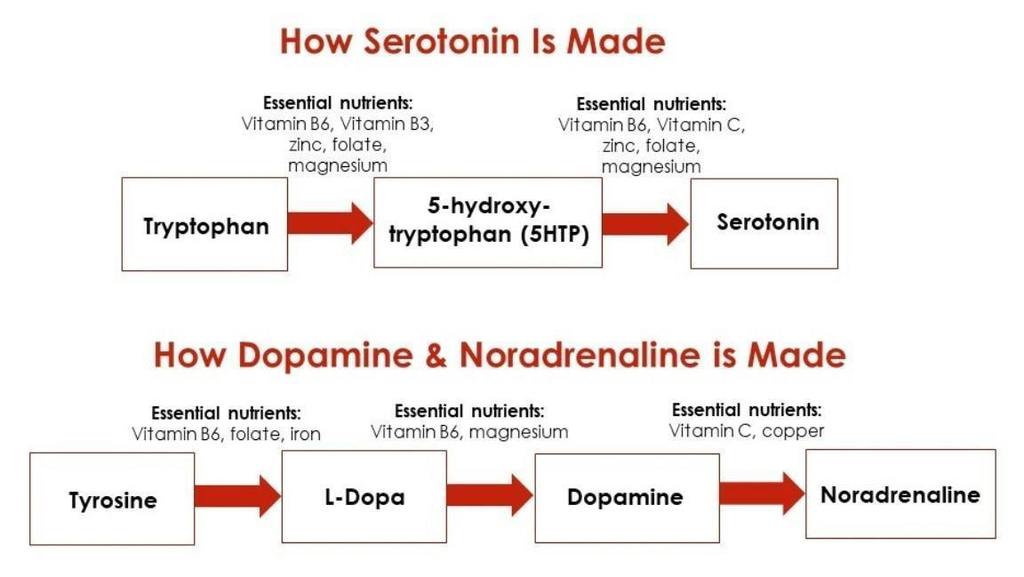
Amino acid neurotransmitters are important for mental health and knowing which ones are out of balance is important for recovery from various mental health problems like depression, anxiety, schizophrenia and much more. There is no 100% reliable neurotransmitter test, however, being aware of the symptoms of deficiencies can help you determine the most appropriate treatment approach.
Neurotransmitters are vital chemicals in our body that communicate information throughout our brain and body. They relay signals between nerve cells called neurons and are important for a large array of physical functions. The brain uses neurotransmitters to tell our heart to beat, our lungs to breathe, and our stomach to digest. Not only are neurotransmitters important for our physical health but they also play a significant role in our mental health, affecting our mood, sleep, memory and concentration. When they are out of balance (or when receptors on cells responsible for receiving neurotransmitter signals are impaired) they have significant effects on our mood and behaviour.
In relation to anxiety, depression and other mental health disorders, the more important neurotransmitters are serotonin, dopamine, noradrenaline (norepinephrine), acetylcholine and GABA. When we are deficient in specific neurotransmitters a number of emotional symptoms are likely. Deficits in serotonin can lead to depression, aggressiveness, anxiety, panic attacks, food and alcohol cravings, irritability and insomnia. Symptoms of low dopamine include depression, stress, mental exhaustion, fatigue, low sex drive and low motivation. Noradrenaline is important for alertness, concentration and attention. Low levels of noradrenaline have been linked to depression.

Amino acids are the raw materials for neurotransmitters and a range of vitamins and minerals are co-factors necessary for their production. There are about 28 amino acids used in the body. The liver manufactures about 80 percent of them, while the remaining 20 percent must be obtained from our diet, hence their name ‘essential amino acids’.
The essential amino acids are derived from proteins, and studies have shown that diets deficient in protein will lead to lower neurotransmitter levels and consequent mental health problems. The amino acid essential for serotonin production is tryptophan, while phenylalanine and tyrosine are the building blocks for dopamine and noradrenaline. The figure above demonstrates some of the important biochemical steps required for the production of the neurotransmitters dopamine and serotonin.
As is demonstrated in the figure above, tyrosine and tryptophan go through a number of metabolic processes in the body before they are finally converted into the neurotransmitters dopamine and serotonin. For this to occur effectively, the body must have adequate stores of specific vitamins and minerals. For example, folic acid, iron, vitamin B6, vitamin C, magnesium and copper are all important co-factors crucial for the production of dopamine. Serotonin production relies on adequate levels of calcium, folic acid, iron, magnesium, vitamin B6, vitamin C and zinc in the body. This fact is often overlooked when it comes to treating mood problems. Unless the body has a good supply of nutrients, a number of physiological processes will be stalled and mood problems will result.
Neurotransmitter levels are influenced by a number of factors. Obviously, nutrition and the body’s ability to absorb nutrients plays a big part, but there are several other major influences on neurotransmitter production. Some of these are detailed below. These causes can have a significant influence on our health and on the metabolic processes in our body.
Mainstream medicine treats neurotransmitter imbalances and the consequent mental health problems through the use of pharmaceutical medication. More specifically, antidepressants such as Prozac, Cipramil and Zoloft are used for the treatment of depression, while benzodiazepines such as Valium and Serapax are used for the treatment of anxiety, stress and insomnia.
Studies show that antidepressant medication is effective for anywhere between 30 to 60 percent of depressed people. Unfortunately, this still leaves anywhere between 40 to 70 percent of people still unwell. Coupled with this are the frequent side effects that are often experienced by people. While newer antidepressants have been shown to be better tolerated, the side effects do still affect a great portion of sufferers. Some of the more common side effects include: anxiety & nervousness; constipation or diarrhoea; dizziness; drowsiness; dry mouth; headache; insomnia; nausea; sexual dysfunction; tremors; urinary retention; and weight gain. Psychological therapy is an effective alternative to medication to treat mood problems.
Although its impact on neurotransmitter levels is still uncertain it is now well recognised that psychological therapy does have a positive impact on mood, probably through its influence on thoughts and beliefs systems. Despite the commonly held belief that medication is the primary way to boost neurotransmitter production, this could not be further from the truth. As you can see from the list of ’causes of neurotransmitter imbalances’ above there are several causes of neurotransmitter problems and fortunately, many of them are changeable. Although we may not be able to change our genes, we certainly can modify our lifestyle and behaviours.
For example, regular exercise can dramatically boost neurotransmitters production. Eating a healthy diet, participating in relaxing and pleasurable activities and limiting alcohol intake are also all positive influences. The use of specific supplements and herbs are also important and have been shown in a number of studies to be effective in increasing neurotransmitter levels and lifting one’s mood.
Although not exhaustive, the list below details some of the important nutrients required for neurotransmitter synthesis:
Neurotransmitter disorders/imbalances are important causes of mental health problems. As discussed, for most people, they, fortunately, can be treated through diet, lifestyle and nutritional supplementation.